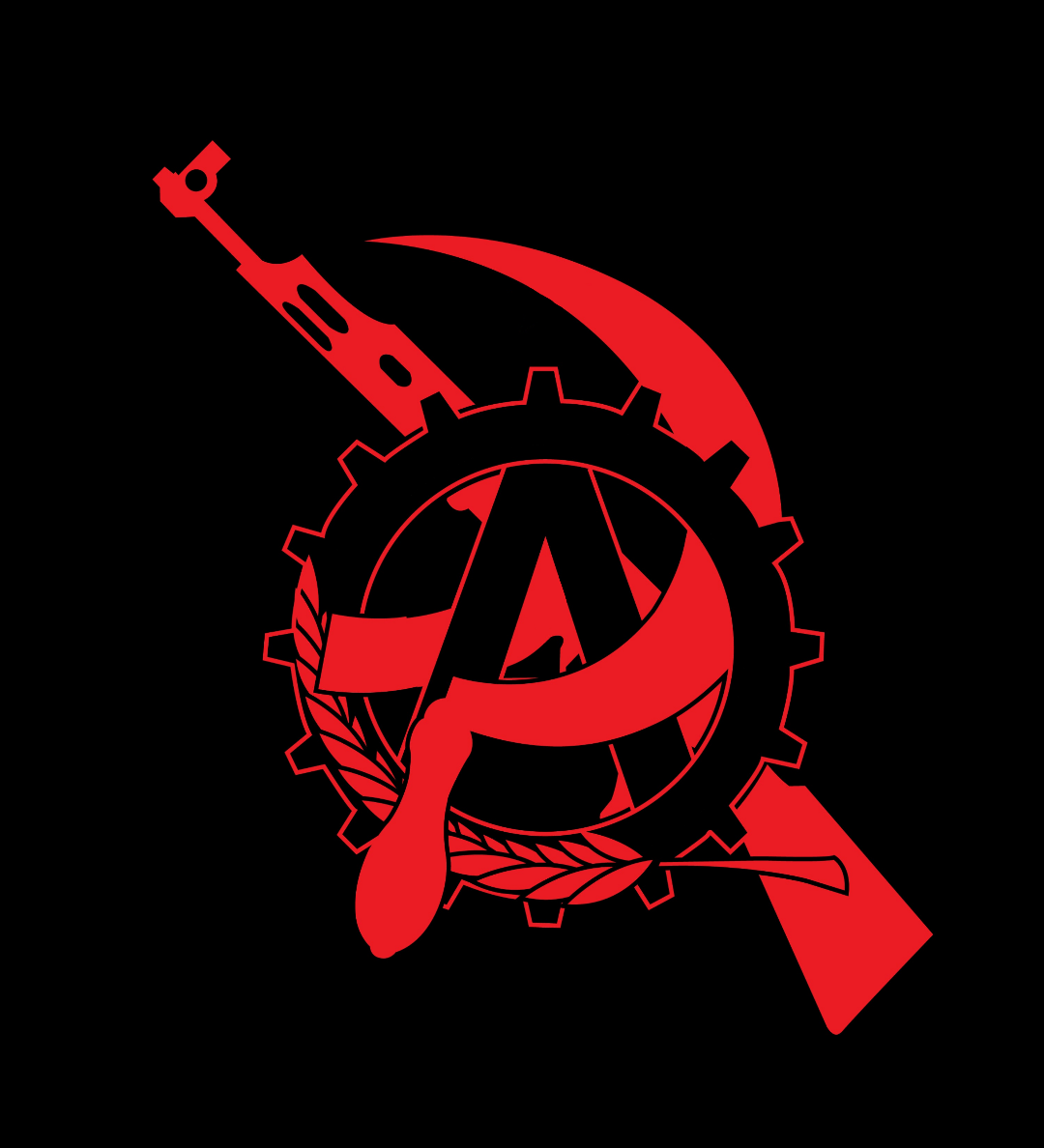the point is not to explout others labor by expropriation of the means of production, no one cares what you do with your own labor
Yes I think the point is the entirely missed by others.
This all just sounds like a free market, or anarcho capitalism, or really just anarchy. Horseshoe theory, and all that…
On communism, the means of production are not for sale. The results of your work through the means of production are yours, and the means itself belongs to the community.
What if a person creates a new type of clothing that has high demand because it’s better than what exists before?
What if that person starts getting interest from other people who want the clothes and they try to trade currency (I’m not sure if in your communist system this exists, so consider other items people have or something) and then transactions start to happen?
What if the person gets so busy, he gets another person to help him with the trades in exchange for a fixed amount?
In which of these steps does it turn from “no one cares what you do with your own labor” to “give us your business or else”?
This simply wouldn’t happen because an anarchist society wouldn’t recognize intellectual property and so it would be trivial to just… make more of this kind of clothing. And no, there is no currency, and barter would be pointless as access to goods is common anyways.
This whole point to me signals a deeper (but common) misunderstanding as to what the point of it all is, though; there would be no incentive or reason for someone to act this way in any kind of postcapitalist society, because the assumptions you are making that even make this situation possible are false.
Labour is not a repulsive act that people have to be paid to do; for virtually any “job”, even the most repulsive, there are some people who are truly passionate about it. But in a society where doing said work is demanded under threat of starvation, any appeal it may have had is soured by the reality of this situation and it shifts from a fulfilling and desirable action to a repulsive one.
As an extra point that not all anarchists will agree with, increases in productivity thanks to automation and technological progress (often spearheaded not by corporate projects under NDA but by the open-source community and individual hackers, only to be commercialized by corporations) mean that the real quantity of work that needs to be performed to uphold humanity at a good standard of living is drastically less than the amount currently being performed. Capitalism is inefficient, both in that it doesn’t allocate resources where they’re productive (accumulation of capital) and because of work duplication and artificial barriers (tech and engineering firms keeping code/designs private or patented, industry keeping trade secrets, etc.)
tl;dr that scenario is impossible.
The thing is, there are jobs that need to be done but no one wants and there are jobs everyone wants but only few are needed/have the ability to do it.
Do you really believe that in a state where everything you need is provided enough people will be “passionate” about sewer maintenance?
The thought of enough people will be passionate about every job in order to fill the required number of positions in those jobs, when everything is provided whether they work or not, is simply a delusion.
People will volunteer to do the job because it is something they (and everyone) needs done. People won’t let their entire community collapse because people “didn’t want to do it”. But these unsavory jobs would theoretically also spark innovation to make the jobs more bearable and probably even unneeded. Better working conditions and more free time leaves time for people to do things like invent and think.
People will volunteer to do the job because it is something they (and everyone) needs done
I did volunteer work in several associations. From personal experience I can tell you that “someone will do it, a volunteer will rise” should not be relied upon. I have seen many instances of tasks that everyone was aware of, and yet no one wanted to do; even though they were important. At the end of the day, guess who completed them? The president of the association, because that’s their responsibility ultimately; until they got sick of always doing these tasks so they did not want to be president again the next year.
In the case of a society where no one is responsible for given tasks, I can only guess that vital tasks would be left undone and the whole society would be collapsing. Imagine getting your electricity cut each day of “insert your most favorite celebration here” because no one felt like working during celebration day. Imagine fire becoming widespread and burning every building because at that particular day, there were not enough people with fireman skills around to extinguish the initial fire
We need to have assigned roles and responsibilities based on our skills. How do we do that in a world where you can say “Na, I know I’m the only expert on this available right now, but I don’t feel like doing it today” and get away with it?
I believe people are like this due to the conditions they live in. Capitalism is a system that encourages selfishness in order to survive. I whole heartedly believe that if conditions changed, people would change. Not immediately of course. No anarchist is saying that it wouldn’t be a rough transition, or that it’s a flawless society, or any of that. But we do think that it would work and that it’d be better in the long run than what we have rn
Good on you to believe that. It’s really sweet that you have so much faith in people.
… I don’t. Look at any society on Earth. Pre-capitalism, feudal, the celts, medieval japan, whatever. Shit ain’t rosy, in fact shit really fucking sucks and people suck and too many of them will mooch and rape and steal and trick and kill and endlessly seek to achieve absolute power over others if they’re allowed to. That’s a basic fact of human nature.
To pretend it’s capitalism’s fault that some people are awful to others or complete freeloaders, is just an insult to those people’s intelligence of free will. A lot of people just suck, they don’t need excuses.
IDK, it’s not like I much care to have this conversation to be honest. It is a purely academic study of a (imo) overly utopist viewpoint, because the vast majority of people either aren’t “good” in the way that you think everyone is (i.e. they know they wouldn’t be a good member of an anarchist society, so they deduce that other people would be either), or they don’t have such faith in their peers due to experience. Either way this is the fundamental reason why anarchism never has, and never will, take off on a large scale, regardless of how much you theorycraft it and try to explain it. Anarchists just disagree, fundamentally, with everyone else on the very nature of humankind.
Easily fixed through voluntary association in the interest of everyone. Stuff could work along the lines of everyone who wants to benefit from thing x must contribute to thing x when it comes to essential but undesirable jobs. You want sewage? You sign up for sewage. Everybody who does, has a week assigned where they must do the necessary maintainance for that utility. In practice, since so many people want sewage, it would end up once every few years. Moreover, these associations could federate and make it so that contributing to those that are shorthanded could exempt you from others. Say, you have the necessary electrical knowledge to work on that system but hate maintaining sewage. You could work on that celebration day when nobody wants to work and in exchange you are exempt from sewage duty.
If someone doesn’t want to contribute in any way to society, that person won’t benefit from society. It’s another thing if someone cannot do anything, but those people are very few. Even those who are bed bound can contribute in some ways.
You want sewage? You sign up for sewage. Everybody who does, has a week assigned where they must do the necessary maintainance for that utility.
So I’m supposed to learn everything about sewer maintinence before this week, or are we throwing untrained people at critical infrastructure simply because they want to use it? And what then if I also want food, transportation, a computer, cat food, smokeables, drinkables, shelter, etc? Do I have to become an expert in all of those things too and work in those to get food, shelter, etc? Have to churn butter for a week if I want access to the butter store, and make bread for a week to get access to the bread lines, then I can make toast?
Personally I’d prefer if there was some way to make what I make or do what I do, exchange those items or services for some thing with an agreed upon value, which I can in turn take to the store and trade for bread and butter.
My experience is that most people only care for themselves and couldn’t give a crap about others. For me that’s just a part of human nature, for you it might be because of capitalism. But how do you know with a different system people’s behaviour will change?
In the Soviet Union there was corruption from top to bottom everywhere you looked. And people did the hard jobs because they were forced to.
Goods are not the only form of incentive. The jobs that nobody wants to do would have more people doing them for less time. For example you can be a graphic designer for 1 year or work the sewer for 1 month.
(Everything you are about to read, put a grain of salt in it, and go read about the system of work in the Inca empire and connections to communism. I’m not saying it was the same thou)
The Inca empire functioned something like this.
And why they where successful.
The people did all sorts of work, throught the year and in turns.
So all shared the labor and the benefits of the labor.There was still the central “state” in the emperor dictating what to do and when to do it. But i think AI will replace that in the future saying where the production needs to go (besides olygarchies, a problem of capitalism is inefficiency, a lot of food going to waste instead to the millions going through hunger. Vacant mansions while people sleep in the streets).
I don’t work because of money.
I need it, I live in a capitalist system.
But i work in public function, I do a lot of schedules in the public pools, the public gym, and the cultural center with theater, exposions, cinema and also the school gym after hours with sport teams from associations and clubs.I clean in most of those places, receptionist work in all, have the keys to everything (they trust me).
All this to say:
Do to to the system we live in and all the shit I went through (disease, deaths in the family) i have a depression.
I am taking medication and see a doctor.
But the work, helps me get throught it better.I wake in the morning to open the place I have on schedule, besides the depression, to assist, and serve and connect.
I do a lot of places and/or schedules that no one wants, holidays, some weekends.
That gives me a lot of extra hours.
I take time went i need. Mostly when my grandma needs 😁I dont get paid extra, and i don’t care, but i always try to show perspective to people.
Be it here or in the everyday life.I remeber being afraid of factory automation and what that would do to the work force, specially in my town, where hundreds or a few thousands work in factories.
What and idiot…those people could live their lifes. Enjoy it, the factory itself produces the products.
Even better, if i need a door for the car I downloaded in the comunal printer 10 years ago, or the one i have at home, I just print another door, recycling the material of the damaged one.But it’s difficult to make people understand what communism even is, when they think the capitalist factory of the world where Apple produces their planed obsulence products and workers, wich are not owner of the means off production, and hrow themselves from the factory roofs wich such frequency, that they put webs to catch them…is comunist…where the f### is China commist.
Don’t words have meaning?
I’m sorry.
Stay safe everyone.
We will do it because we benefit ourselves from having this infrastructure. Certainly the people who first conceived of these systems were passionate about sewer maintenance, no?
The difference is we will not need to coerce people into working 8 or 12 hour shifts, so we would also have more time to devote to other interests and become more well-rounded individuals than we are under capitalism. We see things like sewer maintenance as undesirable drudgery because of how that work manifests under our current system.
And there would also be people that benefit from the infrastructure and get the same benefits from everything while doing easier jobs. That doesn’t sound like equality to me.
Also, not liking being in the middle of literal crap as your job is not because of our current system. It’s because it sucks.
You’re thinking about all this from a capitalist point of view, in which we have to be coerced into being productive. You’re failing to see this through the lens of an actual anarchist/communist society. You assume the same inequities would just carry over. The whole point is to eliminate these hierarchies altogether.
And yes, I do think people would be willing to do these things. I’m not above it myself.
I’m not seeing through the lens of a capitalist, I’m seeing through the lens of a person.
I guess in an anarcho-communist society there would be no formal governament and each person would have to contribute to the discussion. If there is a though job and one person does it for the bennefit of the whole, if they see someone else slacking off not doing work or doing an “easy job” they will get resentful.
This isn’t something that happens because we are used to exchange money for goods. This is because that’s the nature of human relations. Heck, this is something common to pretty much all animals.
The same can be said from hierarchies. If you remove the current ones, humans will form new ones eventually. It’s our nature and in the nature of pretty much everything.
There is a gap between conceiving a system and maintaining it. Sure, there are architects who conceived sewers. But I doubt they went inside to maintain it on a regular basis.
People might not be passionate about sewer maintenance, but they are about having working sewage disposal. And hey, those shitty jobs in this dynamic are valued more highly because most don’t want to do it. I think that’s a good thing.
Yes I do. I have a job many consider repulsive, yet I’m very passionate about your mom.
Ah yes, the classic insult of a true intelectual with a firm grasp on society’s problems and solutions, that can calmly explain away solutions to the problems pointed in his theory.
A truly majestic sight.
I felt really smart when I did it. Getting the job took many hours of study, and careful listening. She was an uncommon woman, but I have a PhD in pussy. My arguement can’t be debunked.
Not everyone has to be passionate about it. You could devise a sort of lottery system for jobs that can’t be automated and suck, where everyone will have to do that job for a set amount of time. People do these jobs for 40 hours a week now because they know it’s necessary for their own survival, so I personally don’t feel like it’s far-fetched to think that people would okay with doing a certain job for way less time a week, knowing that in a few weeks or however long they’ll never have to do it anymore because their name is now gone from the lottery pool, because they know it’s necessary for the survival of society (and thus also themselves).
So would then other people be rotated in order to fill the positions of the people already being rotated and so on?
You could do that. You could also make it a bit more nuanced, where the pool of people only consists of people doing non-vital work. So maybe doctors and nuclear engineers and firefighters and teachers could be excluded, while only people doing non-vital work get rotated in, and it wouldn’t be such a big deal if one person is missing for a couple of weeks or months. Nobody is gonna die if you have to wait a bit longer to get your hair cut or your house painted or to see that new movie, and there would be an understanding that you have to wait a bit longer because important work is being done. You’d also have so many people who are freed up from useless or destructive work like ceo’s, finance, middle managers, marketing, etc that maybe you wouldn’t even notice if someone got rotated in, because everyone else could just pick up like 3 extra hours a week for a little while.
If you divide between people working vital and non-vital work, aren’t you creating two distinct classes where the system is supposed to eliminate all classes?
I’m not sure the problem is so trivial.
Long before the existence of IP, people who developed something new would keep their manufacturing process secret in order to prevent competition. Even today, sometimes they still do (in fact, the purpose of patents is to discourage trade secrets).
Now suppose someone invents a new medicine, or a new alloy, or a new machine, or a new algorithm, and refuses to tell anyone how it was made or how it works.
And suppose reverse engineering isn’t feasible. Maybe it’s too much work considering the value of the product (nobody is interested in reverse engineering your particular favorite shampoo). Or maybe the machine uses sufficiently strong encryption to prevent its reproduction. Or maybe there is some other obstacle.
Again, before modern capitalism these problems were the norm. If you wanted a very particular product, you often had no choice but to find a very particular provider.
As before, at what point does paying someone to help make such a product become exploitation?
You’re still missing a core part of the point. In most/all of the world today and in history, when you make something new, your reward is dependent on stopping other people making or selling the same thing without paying you. It therefore makes sense to keep things secret. People don’t even always do that, though - if you look at GitHub or Thingiverse, you’ll see loads of people giving the right to use their intellectual property away for free. Reasons for that vary, but some are similar to how people would theoretically think under anarcho-communism. Some examples include:
- you’re annoyed that the previous best way to do something is crap, so you make a new one. The more people copying your design, the less the annoying old one gets used, and the less annoyed you are.
- working on interesting projects is interesting in and of itself and finishing annoying ones is satisfying, so when you don’t need a particular reward beyond that, there’s no reason not to share.
- you think your cool new thing will be even cooler if other people collaborate with you, and that’s easier if everyone shares their improvements.
As for things that aren’t generating intellectual property, and just involve doing labour, the idea is that there’ll be enough people upset by something not getting done that they’ll do it proactively. E.g. some people will want to take a look at the sewers once a week to check for blockages because they’re worried their drains might overflow if they don’t. It’s not too different to people volunteering to clean up community spaces today, except people wouldn’t have to do it on top of a day job. If that gets too annoying, people will invent new tools to make it easier or totally automate it, whereas they’d have instead been inventing whatever their manager thought would please investors under the current system.
A cultural shift where nearly everyone agreed this was a good way to do things would be necessary, but it’s not like they aren’t examples of the same ideas working in the real world.
What if the person gets so busy, he gets another person to help him with the trades in exchange for a fixed amount?
If a person A, who already started a business, hires someone (Person B)to work for a fixed amount, than it is has to be only a share of what that person contributes. Otherwise, if the fixed amount is equal to contributing value of the person B, Person A would not gain anything and would not hire him in the first place. Ergo, from the value the worker, Person B, creates, Person A will take some funds for the development and maintenance of the production (material, rent, taxes etc.), and will keep a portion for himself. At that point, that is exploitation, because the Person B gets only a fraction of what he had earned due to the Person A.
Communists are a huge and diverse ideological group, therefore there are at least two different camps to this. Either you nationalize everything and run the economy from the planned position, therefore (through proxy), turning all companies into public property, or the other (my) camp, in which every worker who works at a business is, after a trial time, given the exactly same share as all other workers and has voting right in how the company is managed. Part of his pay still go for the maintenance and growth, but most goes to him as the owner of his own labor.
You missed the third camp. Anarcho-communists would hate both of these solutions.
Hate is a strong word. Also, I am very close to the anarchist line and have written down basicly exacly what happened in Rojava, Catalonia and other anarchist project. What do you think I got wrong?
Nationalizing the economy goes against anarchist ideals due to nationalizing means giving it to the government (entirely contrary to anarchist thought). The second one, even after the “trial period”, has ended is still taking the fruits of your labor. Under anarchism, there are no companies. They are free associations of workers. The workers who work the capital own the capital. And there isn’t money, that’s contrary to communism and no matter how you split it money is unegalitarian. A worker keeps what he wants from his labor, and communalizes the rest. And is thus entitled to what he needs from the community.
Edit: Rojava is also not an anarchist project. At best it’s a libertarian socialist project. And I’ve never heard of this “trial period” stuff in anything I’ve ever read about and anarchist example
I focused on actual attempts, not ideal solutions. Those who implement state capitalism also claim they want a classless, moneless society, yet never get there. Anarchists never got to what you are describing eather.
Then so be it, but it seems like it would be beneficial to do so
I could go out in the woods right now and try to live on my own, but I’d have a much better time in a community with other people
If an individual wants to gain an individual benefit from their work instead of giving it to the community, what would prevent them from bartering for more personal good than they’d get otherwise?
Sharing one’s fruits with the community not only benefits the community itself, but the individual as well. This is anarcho-communism. I’m not the best person to describe it since I’m not that knowledgeable about politics, but I’d encourage you to read The Conquest of Bread, it’s actually a pretty straightforward read: https://theanarchistlibrary.org/library/petr-kropotkin-the-conquest-of-bread
But why would some people not benefit more than average by bartering then by sharing? They would get benefit from both, but it seems like some people could get more benefit than the average community benefits through alternative channels, since not everyone will produce the exact same amount of value.
“From each according to their ability, to each according to their need”
Your focus on arbitrarily determining who creates more value is a by-product of our capitalist society
But it’s one that any slightly selfish person will realize. And if any one person is even slightly selfish, the whole system collapses
One selfish person wouldn’t cause the entire system to collapse – what? lol Read my other comments in this thread.
When your needs are met by the state, you tend to be less selfish. Or not selfish at all since you don’t need to hoard the item. Besides Conquest of Bread, I’d suggest reading Wage-Labor And Capital for more understanding. At least if you are legit wanting to learn.
Than he/she keeps it. You just can’t keep others work…
Well then they do not get the benefits of society? Idk im not Communist but that seems like the best option to me
What keeps individuals from benefiting from society without contributing to it? Who determines appropriate contributions? I don’t know if you can do that in an anarchical framework
The community itself would make those decisions in a way that works for them. Us telling them in the future now from the past how to live their lives is tyrannical
Does the majority need to agree with the decisions? Or could the majority appoint people to make the decisions? Or could one person simply take charge and unilaterally make decisions as a dictator? Would any of those be acceptable?
See my comment above for answers to these questions
How would the community make the decisions? Would everyone have to vote on every issue that appears?
You do this already. If you are part of a church or friend group or organisation or whatever, you usually sort out issues when they come up by talking to one another. Saying people are going to vote is a weird framing of normal collaboration, because most of the time we agree on decisions by talking and compromising
I do agree in the small scale it works (ex: small village). But I don’t agree it scales to society as a whole.
See my comment above
Surely, with so many ways of making decisions that might work for each community, you can name one?
They would probably vote. How they’d vote idk, that’s not for me to decide.
I mean I should be able to name as many as anybody on the planet, including you. My point is that I am not going to say “well they might do X” because then from now on “X” becomes the focal point of the possibilities. I am not even going to hold my future self hostage to what present me suggests
So it’s basically “idk, but I know when we get there it’s going to be perfect… somehow”, got it.
The community themselves decide. If it’s enough of a problem, the community will organize to address it how they see fit. That’s the whole point of anarchism. We don’t have all the answers and we don’t claim to, the people that run into these issues will find the solutions that best suites their needs.
So does the community vote on everything then? If there are too many decisions, could they appoint someone to make some of the decisions on their behalf? Or does every little decision need to be voted on by everyone? If not, I don’t see how it’s different than democracy
Democracy and capitalism are not synonymous.
And about capitalism, rich people (and by “rich”, I mean people that don’t need to work to stay rich and stay getting richer) have more access and influence on decision making them anybody else. Decision power should be spread more evenly, your society can have people delegated to take decisions, but that decisions should reflect the interest of the society as a whole, not only who gets economic power.
Democracy and capitalism are not synonymous.
Agree, but are democracy and anarchy synonymous? The original post was taking about anarchical communism witch I thought was different than democratic socialism.
are democracy and anarchy synonymous? Idk enough of anarchy to answer that.
I thought was different than democratic socialism. AFAIK they are different indeed
Valid point… Didn’t account for the anarchy part
I mean sure, but what we have now are people not sharing the fruits of other people’s labor. Your favorite billionaire did not earn that wealth through their own labor.
Just my own $0.02, but…
If people are hoarding and stockpiling, at least part of the response needs to be to look at the motivation these people have to stockpile and address that motivation. A hoarding problem is probably a valuable signal of some deep societal issue of distribution that needs resolved.
The vast majority of scarcity we face in this capitalist-controlled world is manufactured, so I wouldn’t think actual scarcity would often be an issue, but if hypothetically it was and someone was stockpiling more than they could use of some basic need like food allowing others to starve, I’d say the starving taking the surplus (the portion the stockpiler can’t use) by force would be justice.
Communism isn’t just about division of labour so fruits are spread equally, and is far more about the worker getting screwed in the deal that is capitalism, and a better way to actually divide the fruits of labour so the people actually DOING everything get a fair share.
Capitalists and their supporters won’t read any actual books about this that aren’t written by other capitalists and their shills generally, and it’s far more complex and has many different ideas of how this works even within strictly communist circles, so whatever. People just gonna do buzz lines and memes because of what Ben Shapiro said on Joe Rogan this week or whatever, and I get why it’s so much easier to do that, because theory is boring and exhausting, but it is frustrating to see sometimes.
Wondering how they expect to have the ability to produce anything to be their fruits if they refuse to cooperate with society
They will be lined up with the other anti-revolutionaries.
I think “his labor” and how you define it is the key here. For example it’s different if it’s an individual or the manager of a factory.
Removed by mod
This is my new desktop background.
I’m no specialist in communism or anarchism but it’s the first time I see the term “Anarcho-communism”. And AFAIK anarchism and communism are movements that are looking for different paths to their means (or even different means).
Is “anarcho-communism” a thing? Or is just a made-up term to be a counterpoint to anarcho-capitalist? or just strawman?
Well, that’s new.
Anarchism is a sub-ideology of communism that seeks to abolish all kind of unjustified hierarchy, including capitalism. It’s the farthest left ideology.
“Anarcho-capitalist” is a strange concept that’s very recent and only seem to exist in the USA, that tries to reimagine feudalism in the industrial age, meaning that very rich people are free to have their own army and own massive area of land, where people living there will subjected to the laws of that lord, with no possibility to remove them through voting. It really doesn’t have anything in common with anarchy.
You can read more on the wikipedia page, it seems to be pretty good.
Anarcho-communism is just the longer name of what came to be called anarchism by most observers. The tenets of anarcho syndicalism are fairly close to Marx’s ‘ideal’ communism in theory but obviously Marx, Bakunin and Kropotkin all had differing views on how to achieve those goals.
Your goose will die if it tries to survive alone. Individualism doesn’t work.
But who would bare the cost of goods held in common to avoid the tragedy of the commons?

















